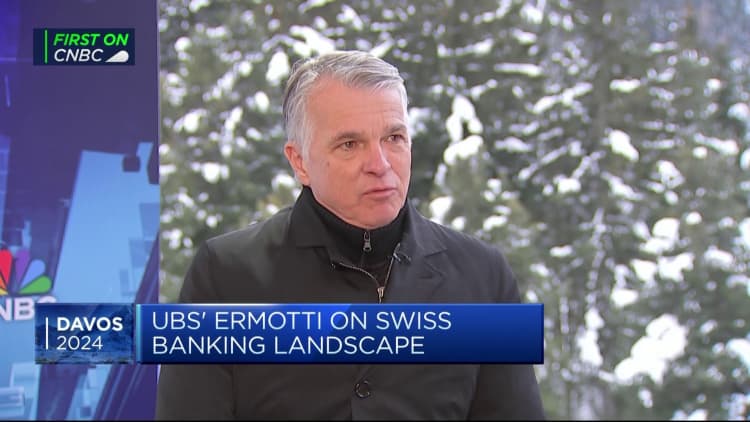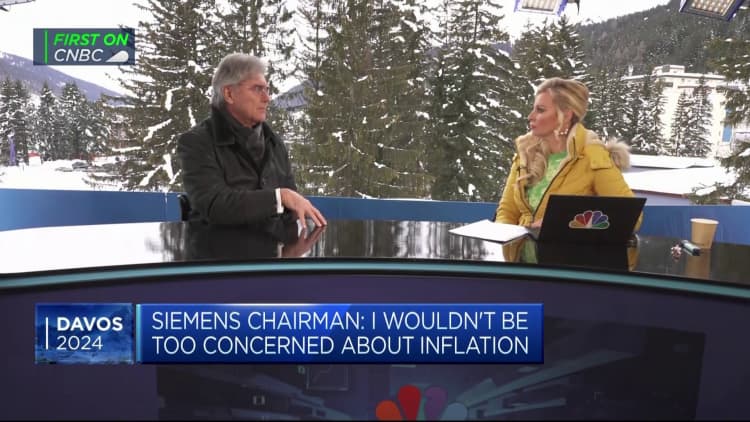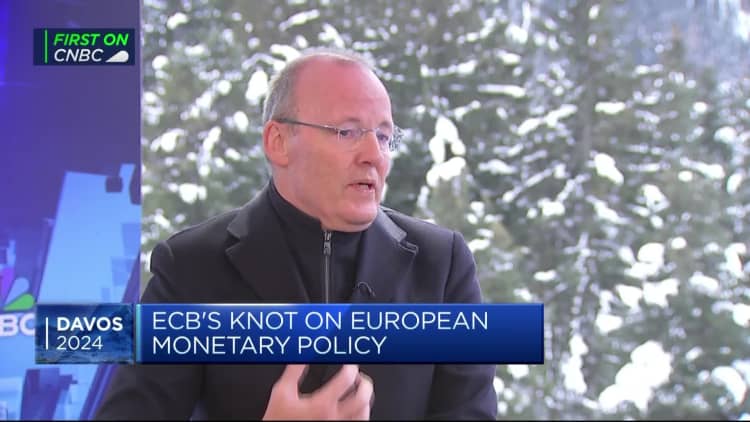European stocks close lower; FTSE 100 down 1.5% after UK inflation unexpectedly picks up


European stocks close lower
European stocks closed 1.1% lower on Wednesday, with all sectors and major bourses ending in negative territory.
Britain’s FTSE 100 index ended the session down around 1.5% after U.K. inflation unexpectedly picked up to 4% year-on-year in December.
— Sam Meredith
Novozymes CEO is confident its merger with Chr. Hansen will close in Q1
Novozymes CEO Ester Baiget discusses the Danish biotechnology company’s planned combination with with fellow biotech firm Chr. Hansen.
UBS CEO: Markets too complacent about rate cuts

Sergio Ermotti, CEO of UBS, outlines the main challenges the Swiss lender faces in 2024, his outlook for central banks and how their communication is creating additional uncertainty.
Siemens Energy chair less concerned by German inflation than by ‘downbeat mood’

The chair of Siemens Energy told CNBC he is less concerned by the recent rise in inflation in Germany than he is by the gloomy public mood.
Joe Kaeser, the former chief executive of German conglomerate Siemens, said base effects and the monthly and quarterly readings meant he was not overly focused on the annual headline inflation figure.
“I am more concerned about the mood which we have in Germany. People are downbeat, everybody’s asking what’s going to be next, what’s in for me. That’s what we need to explain to people so they are more upbeat again,” Kaeser said.
“I always say, look folks, the night is always darkest before dawn. Look at the opportunities.”
Kaeser said the German government needed to present a roadmap on energy, jobs and economic growth, and move past current industry disputes. Meanwhile, the country needs to be a role model on emissions reduction and invent products and services for the future that are economically feasible, he added.
On the major issues hanging over Siemens Energy’s lossmaking wind power unit, Kaeser said: “The skies will clear on wind when we are honest that we have an energy triangle which we cannot escape.”
This is about the balance between sustainability, affordability and security of supply, he said.
“If you want to be very sustainable, you have to do that at a cost. If you want to be affordable, you have to have a bridging technology such as gas-fired turbines which can also use hydrogen. So we have to have more honesty about the cost of sustainability.”
— Jenni Reid
UniCredit CEO: Europe needs banking M&A to propel economy

Andrea Orcel, the group CEO of UniCredit, spoke to CNBC this morning on the sideline of WEF.
He made his case for increasing mergers and acquisitions in the European banking space.
He also spoke about how European banks can compete with their U.S. peers, and how an EU banking union would revolutionize the sector.
—Matt Clinch
Red Sea turmoil could cause tanker shortages, shipping delays: Saudi Aramco CEO
President & CEO of Saudi Aramco, Amin H. Nasser speaks during the Saudi Green Initiative Forum to discuss efforts by the world’s top oil exporter to tackle climate change in Riyadh, Saudi Arabia, October 23, 2021.
Ahmed Yosri | Reuters
Red Sea turmoil amid Houthi attacks could lead to tanker shortages and shipment delays, as ships take longer alternative routes, the CEO of Saudi state-controlled oil giant Aramco told Reuters.
“If it’s in the short term, tankers might be available … But if it’s longer term, it might be a problem,” Amin Nasser said in Davos, Switzerland. “There will be a need for more tankers and are they going to have to take a longer journey.”
Citing security concerns, several shipping providers have now fully suspended or are avoiding travel through the Red Sea and the Suez Canal — the swiftest link between Europe and the Middle East, along with broader Asia. The alternative route by the Cape of Good Hope adds over 10 days of voyage.
Aramco can avoid exposure to the Red Sea through a pipeline linking its eastern oil facilities with the western coast, Nasser told Reuters. Saudi Arabia is the world’s largest oil exporter and was previously subjected to Houthi attacks against its oil facilities in 2019.
— Ruxandra Iordache
ECB member Knot says markets ‘getting ahead of themselves’ on rate cut expectations

Markets are “getting ahead of themselves,” with rate cut expectations which “might become self-defeating,” Dutch central bank President Klaas Knot told CNBC.
The European Central Bank member said that, while he and his peers are optimistic about a return to inflation at 2%, there are risks to that scenario.
“Underlying that projection is an interest rate path, assumed interest rate path, that contains significantly less easing than is currently embedded in market pricing. So that runs the risk to become self-defeating.”
Knot said that the euro zone’s central bank looks at overall financial conditions, and that “the more easing the market has already done for us, the less likely we will cut rates.”
— Jenni Reid
UK inflation rate surprises with rise to 4%, led by alcohol and tobacco
Andresr | E+ | Getty Images
U.K. inflation unexpectedly nudged upwards to 4% year-on-year in December, fueled by a rise in alcohol and tobacco prices.
Economists polled by Reuters had expected a modest decline in the annual headline CPI to 3.8%, after November’s sharper-than-expected fall to 3.9%.
The closely watched core CPI figure — which excludes volatile food, energy, alcohol and tobacco prices — came in at an annual 5.1%, above a 4.9% Reuters forecast and unchanged from November.
“As we have seen in the U.S., France and Germany, inflation does not fall in a straight line, but our plan is working and we should stick to it,” British Finance Minister Jeremy Hunt said in a statement.
– Elliot Smith
CNBC Pro: ‘A trove of rebound opportunities’: Citi and others are bullish on biotech and more, naming stocks
2023 wasn’t a good year for the health-care sector, but some investors expect it to make a comeback this year — highlighting biotech and medical tech as areas to watch.
The health-care industry “appears ready to return to leadership,” given demographic shifts and the benefits of artificial intelligence, Citi said, adding that it expects “healthcare earnings recovery in 2024 to be one of the main drivers of potential outperformance in the sector.”
CNBC Pro takes a look at stock picks and other investing tips for the sector that were offered by the bank — and strategists from elsewhere.
Subscribers can read more here.
— Weizhen Tan
CNBC Pro: ‘Buy on the dips’: Morgan Stanley names its favorite stocks in European tech
Europe’s technology hardware sector’s “roller coaster year” of 2023 ended on a strong note, and a cyclical recovery is now underway, according to Morgan Stanley.
The Wall Street Bank is expecting investors to focus on a cyclical recovery and key themes such as artificial intelligence, advanced packaging, silicon carbide and gate-all-around transistors.
These themes can collectively “drive earnings momentum throughout this year, especially in 2H24,” Morgan Stanley’s analysts wrote, naming six stocks it is overweight on.
CNBC Pro subscribers can read more here.
— Amala Balakrishner
European markets: Here are the opening calls
European markets are set to open in negative territory Wednesday.
The U.K.’s FTSE 100 index is expected to open 45 points lower at 7,507, Germany’s DAX down 73 points at 16,482, France’s CAC down 39 points at 7,351 and Italy’s FTSE MIB down 137 points at 30,250, according to data from IG.
U.K. inflation figures for November are due, as are new car registrations from the U.K., Germany, France and Italy for November.
— Holly Ellyatt









